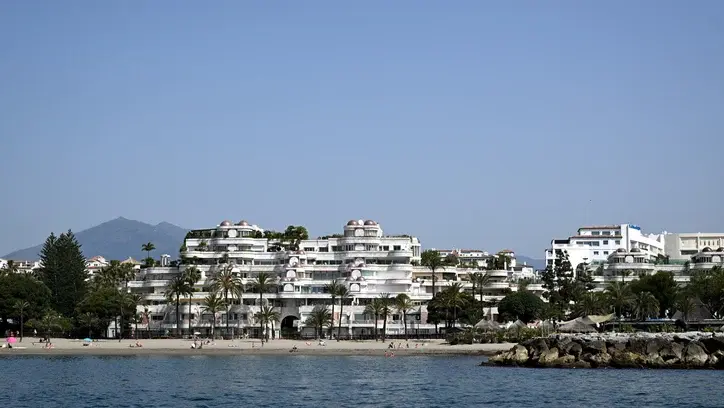
Buying Your First Home in Marbella
Alexey | · 12 min. read
Buying your first home is an exciting milestone, especially when the destination is a place as vibrant and picturesque as Marbella. Whether you're drawn to its beautiful coastline, the rich culture, or the wide variety of properties available, buying your first home here presents unique opportunities and challenges. This guide will walk you through the key steps and considerations to ensure your journey to homeownership in Marbella is a smooth and rewarding experience.
- Table of contents
- What Makes Marbella the Ultimate Destination for First-Time Homebuyers
- 5 Steps to Buying Your First Home
- Understanding Your Responsibilities as a Homeowner
- Settling In: Making Your House a Home
- Final Thoughts: Successfully Purchasing a Home in Marbella
What Makes Marbella the Ultimate Destination for First-Time Homebuyers
Marbella is a top destination for both first-time homebuyers and seasoned investors. With its blend of traditional Spanish charm and modern amenities, the city attracts people from all over the world. The region offers a wide variety of properties, ranging from affordable apartments to luxurious villas, catering to different budgets and lifestyles.
Aside from the beautiful surroundings, Marbella’s favorable weather, vibrant and luxurious lifestyle, and strong real estate market make it an appealing choice for those looking to buy their first home. Whether you're seeking a permanent residence or a holiday retreat, Marbella provides an ideal environment to begin your homeownership journey.

5 Steps to Buying Your First Home
When it comes to buying your first home in Marbella, there are several key steps to ensure a successful purchase. Whether you’re looking for a cozy apartment or a luxurious villa, these steps will guide you toward making informed decisions that align with your goals and budget.
1. Understanding the Marbella Real Estate Market
Situated on the southwestern coast of Spain, Marbella has long been a prominent destination for tourists and expatriates alike. Known for its sunny climate, luxurious lifestyle, and breathtaking Mediterranean coastline, Marbella effortlessly combines traditional Spanish charm with modern amenities. This unique blend makes the area highly appealing, especially for those buying their first home.
Marbella's real estate market offers remarkable diversity, ranging from budget-friendly apartments ideal for first-time homebuyers to opulent villas catering to the high-end market. For anyone venturing into buying their first home here, recognizing the extensive variety of properties is a critical step in making an informed decision.
In recent years, the demand for property in Marbella has consistently risen, driven largely by international buyers. This increasing interest stems from several factors, including favorable weather, a high quality of life, and the availability of premium properties.
If you're buying your first home, navigating this dynamic market requires a thorough understanding of local regulations, historical trends, and emerging customs that could impact your purchase. To help you navigate the Marbella real estate market and make confident decisions, here are some essential insights tailored for first-time homebuyers:
- Average property prices:
- Apartments: Generally, range between €250,000 and €1 million, providing options for different budgets.
- Villas: Prices can start from €500,000 and may soar up to €10 million for the most luxurious estates.
- Popular areas to buy real estate:
- Golden Mile: Known for its high-end properties and exclusive amenities.
- Puerto Banús: Offers a vibrant nightlife and luxury shopping experiences.
- San Pedro de Alcántara: A more traditional area that retains Spanish charm.
- Trends and market forecasts:
- Continuous demand for luxury properties: This segment remains robust.
- Increasing interest from Northern Europeans post-COVID: Attracting a new wave of buyers seeking permanent relocation.
For the most up-to-date and detailed information on the Marbella real estate market, check out The Agency Marbella Market report.
2. Finding the Right Property
Once you've become familiar with the Marbella real estate market, the next important step involves actively searching for the ideal property that aligns with your needs and desires. This phase of the process requires considerable patience and a well-defined set of criteria, which can greatly enhance your efficiency and effectiveness.
Here are some critical factors to keep in mind as you begin your search when buying your first home:
- Budget
- First and foremost, determine the maximum amount you are prepared to invest in your new home. This figure should be realistic and reflective of your financial capacity.
- Don't forget to account for the additional costs often associated with property purchases, such as taxes, legal fees, and maintenance charges. Accurately estimating these can prevent future financial complications.
- Type of Property
- Identify the specific type of property you are interested in. Whether it’s an apartment, a villa, or a townhouse, being clear about what you want can simplify the search.
- Consider the size and layout of the property, especially the number of bedrooms and bathrooms needed to accommodate your lifestyle comfortably.
- Location:
- Evaluate the proximity to essential amenities such as supermarkets, schools, hospitals, and recreational facilities. This aspect significantly influences daily living convenience.
- Assess the safety and overall environment of the neighborhood. It's beneficial to visit the area at different times of the day to get a well-rounded perspective.
- Future Prospects:
- Think about the potential for property value appreciation over time, considering any upcoming infrastructure projects or urban developments that could alter the current landscape.
Employing the services of a reputable real estate agent who specializes in the Marbella market can be extremely advantageous. These professionals offer exclusive listings and insights that may not be easily accessible online.
3. Legal Considerations
Buying property in a foreign country involves navigating through a set of legal requirements and protocols that can often seem overwhelming for first-time homebuyers or those unfamiliar with the process.
Spain, including Marbella, has its own particular legal framework and procedures that must be followed when purchasing or buying your first home. Understanding these legal considerations is crucial to ensure a smooth transaction and avoid potential pitfalls.
Here are the essential legal steps involved in purchasing property in Marbella:
- Obtaining a NIE Number
- Foreign buyers are required to obtain a NIE (Numero de Identificación de Extranjero) number. This identification number is essential for any financial or legal transactions you’ll undertake in Spain.
- Engaging a Lawyer
- Hiring an independent lawyer is indispensable for navigating the legal maze. An experienced lawyer can help you understand local regulations, negotiate favorable terms, and ensure that all legal aspects are properly managed.
- Property Checking
- It’s vital to conduct thorough due diligence to confirm that the property is free from any debts, legal entanglements, or encumbrances. A qualified lawyer can assist you in verifying this information.
- Additionally, ensure that the property has been legally constructed and possesses all necessary permits and documentation.
- The Contract
- Initially, a preliminary contract known as Contrato de Arras is signed to reserve the property. This contract usually requires a deposit, which signifies your commitment to the purchase.
- The final contract, or Escritura de Compraventa, is then drafted and signed in the presence of a notary. This document confirms the transfer of ownership and must be meticulously reviewed before signing.
4. Financing Your Property
The financing aspect of purchasing a home is often one of the most critical components, especially if you are not planning to buy the property outright. In Spain, mortgages are readily available to non-residents, although the terms and conditions might vary compared to those offered to residents. Understanding these options can significantly impact your buying experience.
Here are the key factors to keep in mind when navigating the financial side of buying property in Spain:
- Mortgage Options:
- Evaluate the differences between fixed-rate and variable-rate mortgages. Fixed-rate mortgages offer stability with constant interest rates, while variable-rate mortgages may fluctuate based on market conditions.
- The tenure for mortgages can generally range from 10 to 30 years, allowing you flexibility in terms of monthly payment amounts and overall financial commitment.
- Loan-to-value Ratio:
- For non-residents, Spanish banks typically offer up to 70% of the property's value. This means you will need to have the remaining 30% available as a down payment.
- Interest Rates:
- Currently, low interest rates make this an appealing time to buy real estate. However, rates can vary from bank to bank, and it’s prudent to compare them to secure the most favorable terms.
- Required Documentation:
- You'll need to provide proof of income, which typically includes recent pay slips, tax returns, or other financial documents.
- Bank statements are also necessary to demonstrate financial stability and the ability to meet mortgage payments.
- Additionally, you must submit detailed information about the property you intend to purchase.
Always compare mortgage offers from different financial institutions to ensure you get the best deal. Some well-regarded banks in Spain that offer mortgage services to non-residents include BBVA (www.bbva.es) and CaixaBank (caixabank.es). These banks provide a range of mortgage products tailored to meet diverse needs.
5. Completing the Purchase
The concluding stages of buying your first home encompass finalizing various administrative and legal formalities. These steps are crucial to ensuring that the property's transfer of ownership is legitimate and binding. This phase involves activities such as signing the purchase contract, finalizing mortgage arrangements, and registering your newly acquired property.
The crucial steps to complete your property purchase include:
- Final Inspection:
- Conduct a final inspection to ensure that the property meets all the agreed-upon terms and conditions. This step helps identify any discrepancies that need addressing before the transfer of ownership.
- Signing the Deed:
- The final purchase contract, known as Escritura de Compraventa in Spain, is signed in the presence of a notary. This formalized document confirms the legal transfer of property ownership.
- Payment of Purchase Price:
- The remaining amount of the purchase price is transferred to the seller at this stage. Ensure that all financial transactions are accurately recorded and confirmed.
- Registration:
- The completed documentation and your ownership need to be duly registered with the local Land Registry (Registro de la Propiedad). This registration formalizes your ownership and protects your legal rights over the property.
For additional insights and helpful information, you can check out our comprehensive FAQ guide that details the frequently asked questions about the property-buying process in Marbella.
Understanding Your Responsibilities as a Homeowner
Becoming a homeowner involves a series of ongoing responsibilities and obligations that ensure you maintain the value and condition of your property. From regular maintenance to paying applicable fees, these tasks are essential for sustaining your investment and enjoying your new home without complications.
Some of the key responsibilities you will need to manage after buying your first home include:
- Property Maintenance:
- Regular upkeep of the property is vital to maintaining its condition and value. This includes routine cleaning, repairs, and general maintenance tasks such as gardening and pest control.
- Utility Bills:
- Ensure timely payment for utilities such as water, electricity, gas, and internet services. Prompt payments prevent disruptions and additional charges.
- Community Fees:
- If your property is part of a community or homeowners' association, there will be regular community fees to cover the maintenance of shared amenities and services such as swimming pools, gardens, and security.
- Property Taxes:
- Annual property taxes are mandatory and payable to the local municipality. Ensure that these payments are timely to avoid penalties and legal issues.

Settling In: Making Your House a Home
Once the purchase is finalized and you've assumed your new responsibilities, it's time to turn your property into a home reflecting your tastes and personality. This process involves personalizing the interior, making necessary renovations, and possibly enhancing outdoor spaces.
Here are some steps to add personal touches to your home:
- Interior Design:
- Consider hiring a professional interior designer or embarking on a do-it-yourself project to create spaces that suit your taste and lifestyle. Thoughtful design can transform a house into a cozy and aesthetically pleasing home.
- Furniture:
- Select furniture that complements the style and layout of your home. Quality furniture can enhance comfort and add to the overall appeal of your living spaces.
- Renovations:
- Identify areas that may need renovations, such as the kitchen, bathrooms, or storage spaces. Well-planned renovations can significantly increase the functionality and value of your home.
- Landscaping:
- Invest in landscaping to improve the exterior appearance and usability of your property. An inviting garden or patio area enhances outdoor living spaces and adds curb appeal.
For more tips on managing your property after the purchase, visit Tips After Buying a House to ensure you’re fully prepared for the responsibilities of homeownership.
Final Thoughts: Successfully Purchasing a Home in Marbella
Buying your first home in Marbella is an exciting and rewarding venture, but it requires thoughtful preparation and attention to detail. By taking the time to understand the real estate market, legal requirements, and financing options, you can confidently navigate each step of the process. From securing the right property to managing homeownership responsibilities and personalizing your new space, a well-planned approach will ensure a smooth transition into your new home.
Key Takeaways:
- Research the Marbella market: Familiarize yourself with property types, locations, and current trends to make an informed decision.
- Set a realistic budget: Consider both the cost of the property and additional expenses like taxes and maintenance.
- Understand legal processes: Engage a lawyer and ensure all necessary paperwork, including NIE and property checks, is completed correctly.
- Explore mortgage options: Understand the terms, rates, and required documentation to secure financing.
- Complete all necessary paperwork: Ensure that the purchase contract is signed, payments are made, and the property is properly registered.
By staying organized, seeking expert advice, and carefully considering all aspects of the buying process, you’ll be able to enjoy your new home in Marbella and make the most of this wonderful lifestyle.